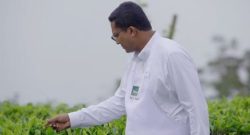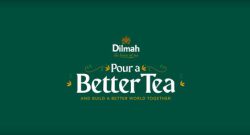Author: Admin
A Tea Grower In Training Since 4 Years Old – Amrit’s Story
We’ve waited over a decade to release this story. Since 4 years old, Amrit Fernando has followed in his grandfather’s footsteps – the World’s Most Experienced Teamaker
We are three generations of tea farmers
We love tea, and that’s our passion – that’s the difference between farmers and traders. It’s all about the leaf, because that’s where taste and natural goodness begin. But it’s also about purpose. Because that comes from a family business with family values. Those are the life lessons the 3rd generation of the Dilmah Family grew up with, under the guidance of their grandfather – Merrill J. Fernando, the tea farmer from a tiny fishing village in Sri Lanka, today the World’s Most Experienced Teamaker 71 years on.
Soul
Guided by the philosophy that ‘business is a matter of human service’, Dilmah believes in ethical tea production focused on its core values of quality, tradition, ethics, integrity, and sustainability. Furthermore, Dilmah Tea is committed to contributing 15% of its profits to the MJF Charitable Foundation, which strives to empower disadvantaged communities, and to Dilmah Conservation, which is dedicated to safeguarding our planet. From impressive projects that protect our environment to community uplift programs that have impacted thousands of lives, Dilmah Tea aspires to change the world, one sip at a time.
Tea Inspired Mixology
The intricate art of blending nature’s most indulgent beverage with exquisite ingredients to create unique concoctions, tea mixology has become a global craft. It requires a delicate and creative approach, with a deep understanding of each tea’s unique flavour notes and the ability to unite them with complementary ingredients harmoniously. Dilmah Tea challenges mixologists to create the perfect drink by seamlessly matching ingredients with the tea’s unique flavour profile, from non-alcoholic mocktails to sophisticated cocktails and shooters. This requires a deep understanding of the influence of terroir, soil, and temperature on tea, ensuring that every ingredient complements the tea’s flavour notes. Dilmah’s prestigious ‘Mixology Playoff’ competition draws top mixologists from leading resorts worldwide to compete for the coveted title. With endorsements from renowned mixologists such as Tomek Malik and Alberto Pizzario, Dilmah strives to inspire aspiring culinary enthusiasts to experiment with crafting their own deliciously unique concoctions using the finest tea from Ceylon. Explore our delightful recipes, and unleash your creativity to craft your own signature blends.
ASMR Portal: Visit Our Tea Gardens
Listen to how your tea is made with this soundscape: Take a walk through fragrant winds, gentle sunshine, dewdrops on tender shoots, crunching of soil underfoot, and fresh tea leaves being plucked.
Brewin’ It Better (ft. CG Pekoe, LL Tea Brewer and Amrit F.)
If brewing tea had a music video, our Ceylon Golden Pekoe and Luxury Leaf Tea Brewer is about to make it big!
Pour A Better Tea
A tea is made better when ethics are stirred and poured into every single serving. When every cup, sip and taste delivers on a dream.
Nature Corridor at Endana
Initiated in 2018 by Dilmah Founder, Merrill J. Fernando, ‘The Endana Nature Corridor Project’ aims to create a seamless migration path for endemic species of plants and trees between the fragmented Iharakanda and Walankanda Forest reserves. This remarkable project is one of the most effective ways to link habitats, resulting in several environmental benefits such as ecological restoration and increased biodiversity. The success of the ‘Endana Nature Corridor Project’ has made it a model for future large-scale nature corridors. Its accomplishments, which include uprooting tea plants that divided the two forests to incorporating livelihood upliftment programs to encourage the sustainable use of forest resources, have been instrumental in achieving this status. The ‘Endana Nature Corridor Project’ is a testament to our vision to showcase exemplary approaches to conserving nature and promoting ethical practices within the tea industry.








